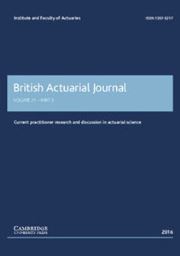Article contents
The Economy, Society and the Actuarial Profession 1856-2006
Published online by Cambridge University Press: 10 June 2011
Abstract
The paper identifies two major trends in the economic and social history of the last 150 years, and discusses their effect on the actuarial profession. The major economic trend is globalisation, with which is associated specialisation of function. The major social trend is the gradual collectivisation of society. Neither of these trends has developed monotonically. Both have developed in a ratchet-like movement over time. Globalisation is reflected in the overseas expansion of British life assurance companies up to 1914, followed by an extended period of retrenchment before expansion was resumed in the last quarter of the 20th century. The effect of the collectivisation of society on the actuarial profession has been felt most acutely in an intensification of the regulation of financial services.
- Type
- Sessional meetings: papers and abstracts of discussions
- Information
- Copyright
- Copyright © Institute and Faculty of Actuaries 2006
References
- 1
- Cited by


